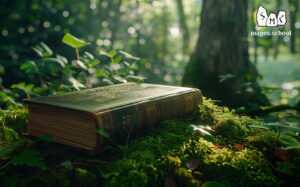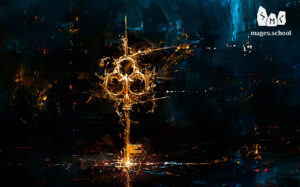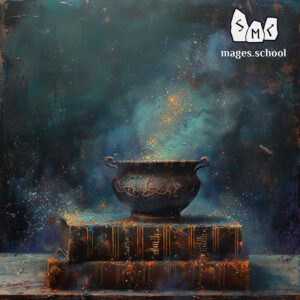How to read magical literature?
One who follows the path of magical development always strives to gain knowledge. And our main source is, of course, books. Surely each of you has encountered different genres of literature on your journey, from entertainment and news to occult grimoires and serious scientific publications. And you’ve probably noticed that all books have different effects. Even books of the same genre, even books by the same author, are perceived and experienced differently. The reasons for this phenomenon are explained in our article.
In order to make it easier for us to analyse literature, we will conditionally classify books according to the effect they have on us when we read them. There are four main categories. Of course, it is possible to distinguish more types and subtypes, but it is more difficult to work with a large number of them, and if we start to generalise, to extend them by some key feature, we will still come back to these four categories.
So, the first category of literature is that which arouses our emotions, that which excites our Astral body. Such literature is easy to read, easy to remember, but also easy to forget. When we read it, we feel inner excitement. But when we finish reading it, everything calms down and goes back to normal.

For a better understanding we can use an example. If we take a pot of water and stir the contents with a spoon, we will create a funnel or whirlpool in the pot. Perhaps some of the sediment at the bottom of the pot will rise and dissolve into our water, giving it a different quality. But the sediment may not rise. So we are not adding anything new to the water, we are just stirring it, and the change in the quality of the water, if there is one, is at the expense of those components that were already in suspension in the water.
The second category of literature is often disguised as the first, but its key feature is that it does not excite our emotions, that is, our Astral body remains in a state of complete rest. Nevertheless, after reading it, we feel that something has subtly changed inside us, we are not the same as before, and our view of the world has undergone some changes. Returning to the same analogy of water in a pot, we do not take a spoon, we add a few grains of manganese to the water and see that the water has changed colour, while the surface of the water has not trembled. So we get a change in the quality of the water because a new component has come from outside.
The third category of literature is more explicit, it is not as hidden and disguised as the second category. These are serious books with very specific content. That is, if it says ‘practical magic’ on the cover, then it is. This type of literature can be quite easy to read, and can be difficult to read, but the key feature is that the information from these books is not all assimilated and not immediately, it takes some time to process it. The content of such a book is quite difficult to retell if you don’t take notes while reading. Individual thoughts may be understandable, but they do not create an overall picture. In our example with a pot, it is a certain crystal-like additive that falls to the bottom of the pot and dissolves rather slowly. Such literature needs energetic nourishment in the form of stirring the water with a spoon, because all information needs energy to be unpacked, otherwise that information remains unrevealed, dormant. While the information is not unpacked, it has a partially useful function – it makes the consciousness heavy, and keeps it in a dense current of information which a light consciousness cannot handle.
The fourth category of literature is similar to the third, but the main difference is that the information it contains is not assimilated at all. It falls like a stone to the bottom of the pot and lies there, not changing the properties of the water, but adding weight to the pot. Why do you need such stony literature, you may ask. After all, this category is also on the list of required reading in the General Theory of Magic (GTM) course. The point is that the fourth category, unlike the third, has the function of making the consciousness completely heavy.

We study things that have nothing to do with ordinary life, things that are sometimes difficult to understand. In order to pull our consciousness out of the ordinary layer of information, we should press it down, train it, not to let it slip away into the world of pink dreams, not to let it fall into rigid mental settings. And our consciousness will desperately resist this training. And only literature of the fourth category will save us. Who knows, perhaps in the future this category of books will become less digestible for you personally, and you will find a worthy use for it.
What literature will be given in the GTM course?
The second, third and fourth categories of literature will be given in the GTM course, because everyone is quite capable of finding the first category on their own. And here it is very important to provide oneself with a variety and diversity of different categories of literature and not to stick to only one. At the same time, literature of the first category should not be underestimated, it should be present to give the energy of emotions for the taste, for the sweetness, for the unpacking of the received information. Ideally, you should choose such a selection, such a combination of literature, that will have the maximum effect on your personal path of knowledge. And there are no universal recipes for what to read and when, because each individual consciousness is unique. That is why it is so important to find your own recipe.
And one more important point. Knowing these four categories of literature, you will realise that each book has a different purpose and a different effect it can have on you. And you will probably agree that you should not expect from a particular book what it cannot give. So you must learn to identify the category of literature and maximise the effect of that literature on your consciousness. But this is a matter of practice. The more you read, the easier it will be to recognise these moments. Good luck on this path!
Additional Information:
Literary Sources:
